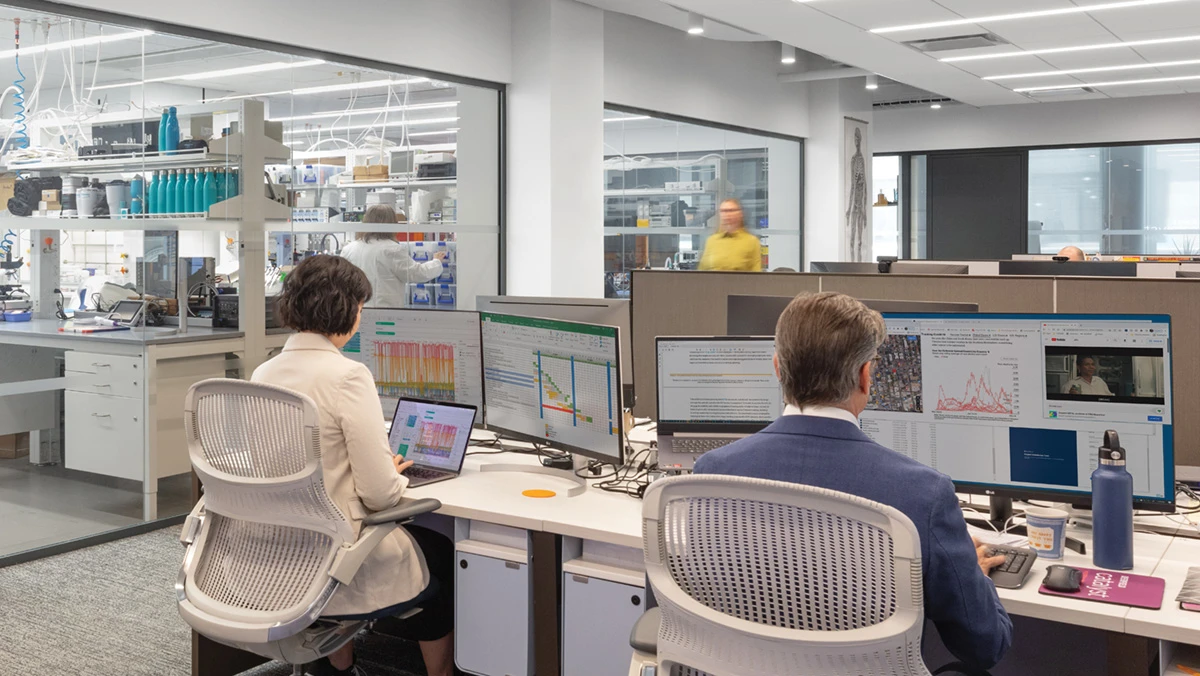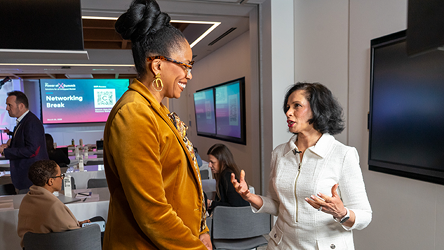August 26, 2025
Article
From Lab Bench to Startup: How Scientists Can Make the Leap

Credit: Image created by Cure, ChatGPT
Overview
More PhDs are trading academia for entrepreneurship. Founders from Aggregate Biosciences, Celmatix Therapeutics, Daré Bioscience, Gameto, GenKardia and Metallomix share how mentorship, business acumen, and the right support systems can turn discoveries into thriving startups.
Lessons from founders who turned academic research into healthcare ventures
Years of experiments, publishing papers and generating innovative ideas can build a scientific career in academia. But to impact in the real world, many researchers take the next step to turn their discovery into a commercial venture.
That transition, however, can feel daunting. Making the leap from academia to entrepreneurship can feel like stepping off a cliff without a parachute. The rules are different and the stakes are higher. Funding comes from investors, not grants, and success is measured in patients served and markets reached, not publications.
"We're living in a day and age where technology is innovating and progressing faster than any of us probably anticipated. That means a lot of the innovation that PhDs and postdocs are doing can and will be translated to clinical use," explained Christian Kramme, PhD, Chief Scientific Officer of Gameto, a New York City-based biotech company known for its pioneering application of cell engineering to address critical unmet needs across a woman’s life span.
He continued, "Building the right team and finding a good support architecture of people who are business-, legal-, finance- and compliance-minded can help take some of the ideas that are in your head or on paper and guide them toward what is going to make a difference in a patient's life."
With the right mindset, mentorship and strategy, you can turn promising ideas into products with potential real-world impact, building ventures with legacies that extend far beyond the lab. Here are some tips on how to get started.
Get a Mentor…or Two
Manija Kazmi had been working for decades at The Rockefeller University when her lab began studying the different types of amyloid, a protein involved in Alzheimer's and other diseases. She and her colleagues showed that not all amyloid is created equal, which might explain why patients respond differently to current amyloid-targeted drugs.
She and her team founded Aggregate Biosciences. The company is developing novel diagnostics and therapeutics to detect and eliminate amyloid aggregates in the blood, aiming to change the way amyloid-related diseases like Alzheimer’s and certain forms of type 2 diabetes are diagnosed and treated, work for which is became a finalist for the 2025 XSeed Award. But becoming an entrepreneur was not something she considered a lifelong goal.
"My kids were grown, and I was at a phase of my life when I thought I could try a few more things. I did not have starting a biotech on my BINGO card, but it felt absolutely right," she said.
Mentorship has been a crucial component of her journey. In early 2025, Kazmi was accepted as a Westchester County Biosciences Accelerator (WCBA) Cohort of Life Sciences Startup, which provides founders with a fundable business plan as well as a professional network.
"For me, mentorship has been key. Finding mentors and not being afraid to ask for input and help are very important. I don't have any issues talking to anyone about anything, because I feel that people in general want to share their knowledge and expertise," Kazmi said. "Seek out mentors who can give you guidance, and pursue programs that can help you understand how to make this leap. It is a tremendous leap from academia to entrepreneurship, and for me, being part of the WCBA and the mentorship that has been offered have allowed us to raise the bar for our company."
Explore Opportunities Outside Academia
If you're interested in leaving academia but desire more experience in the world beyond your lab, consider applying your expertise to get a job in the biotech industry. Richard Nkulikiyinka, MBBChir, MRCP, went to medical school in Germany and the United Kingdom. As an internal medicine resident in the UK, he observed how cardiovascular emergencies affected people's lives. He was curious about medications that could help patients recover and started to learn more about drug discovery.
"I decided to do a stint for a couple of years in the pharmaceutical industry to learn about drug development, and then go back to clinical practice. I also began thinking about unmet needs and found myself asking ‘what else is there to be solved?’" Nkulikiyinka recalled.
That stint turned into more than a decade, and counting. He also recognized the value of a physician's training in drug development.
"You really need a physician from the get-go through preclinical development, early development and into late-development commercialization. There are always physicians involved if you want to get things right," Nkulikiyinka contended.
After 16 years on that journey, he decided to "get on the entrepreneurship train" with David Zebrowski, PhD, whom he met at a conference. Together they founded GenKardia Inc., which is developing a novel treatment for people with diastolic heart failure. GenKardia won a 2025 XSeed Award for this innovation.
Said Nkulikiyinka, "David knocked on my door exactly at the right time!"
Learn the Business of Business
Most laboratory investigators have ample scientific knowledge and experience, but far fewer have formal education or training in finance and business. Learning how to raise capital and run a company are essential to the success of a new biotech venture. There are two ways to go about it: Learn it yourself, or bring on others who have that expertise.
Sabrina Johnson, President and CEO of Daré Bioscience, Inc., took the first route. She was a biochemical engineer who began her career as a research scientist working on recombinant therapeutic proteins.
"I loved the science, but I did not necessarily want to be the person in the laboratory doing it every day," she recalled. She went back to school for an MBA at the Thunderbird School of Global Management and then transitioned to the business and finance side of the biotech drug development industry before starting Daré. The company’s business model aims to identify therapeutic gaps related to women's health and develop novel programs to advance potentially transformative therapeutics to improve patient outcomes.
"I was not planning on starting a company. I'm not someone who ever wanted to become a CEO. I refer to myself as the 'reluctant entrepreneur,'" Johnson said. "But I can't imagine being the CEO of a drug development company without my background, because there's so much to navigate. I do feel like I'm equipped. I've lived in various roles, and I can hear my team in a different way than I might be able to if I hadn't had those experiences."
Build Your Village
Most successful entrepreneurs emphasize that they could not have done it alone. A collaborative team with professionals from different backgrounds in all aspects of running a business is critical to get a new company off to a good start and to achieve sustained growth.
Sergei Petukhov, DVM, CEO of Metallomix, Inc. — a Cure Collaboration Residency company — recommends joining an incubator to connect you to the ecosystem in which you want your company to thrive. Metallomix is developing disease-modifying drugs based on isotopically modified zinc for diseases such as cancer, neurologic conditions and metabolic disorders.
"It takes a village to raise a startup. If you're in academia, you may have a sense of security or familiarity. But if you want to build a startup, you should separate your activity from what you do in the lab and become a part of an incubator or accelerator, like Cure," Petukhov suggested. He encourages new entrepreneurs to openly ask for help.
"Don't be afraid to ask for help. Most founders of companies who are scientists know science very well, but you have to ask for additional expertise. Don't be shy to reach out to people who have already built companies and have them advise you in terms of early development," he advised.
Build a team that includes people with experience developing businesses, building company infrastructure, raising venture capital, coordinating study design and analyzing data. "These people can put the company in biotech formation mode, not just scientific mode. Bringing them on board is crucial for a company," Petukhov added.
Leverage Your Academic Training
While sharpening your business acumen and assembling a multidisciplinary team of advisors are vital for establishing a biotech startup, you'll be gratified to know that your academic training will come in handy, too — and not just the science.
Piraye Yurttas Beim, PhD, founder and CEO of Celmatix Therapeutics, Inc., says her experience in academia set her up for success in the commercial world. The company is developing a novel product to extend ovarian function and improve women’s long-term health.
"The biosciences PhD lifecycle very closely resembles the lifecycle of a startup. You have to identify an area of unmet medical need, come up with a creative solution, mobilize resources, communicate your findings, publish and graduate, and that's the same lifecycle for innovation and entrepreneurship as well," said Beim. She believes that pursuing a PhD taught her how to learn.
"Learning the business specifics is easier now," she asserted. "There are more resources than when I started in 2009 — like incubators, accelerators and training programs. I learned a lot about entrepreneurship from helping get a lab off the ground and getting a PhD or postdoctoral project going. It would be great for the field if more academic scientists felt empowered to get their innovations into the private sector."
For more information about the XSeed Award, visit https://wewillcure.com/network/xseed-award. The 2025 XSeed Award provided grants of up to $250,000 to New York City minority- and women-led life science and healthcare startups working on novel preclinical drug development projects. Winning teams also join the ecosystem of Cure.





